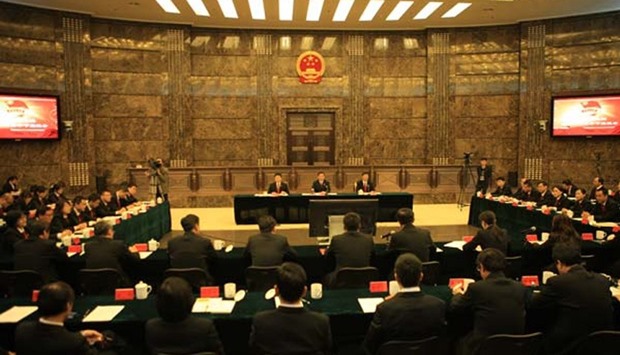The sentences come as authorities pursue whatlabour activists have described as an ‘unprecedented’ campaign of arrests against organisers.
Zeng Feiyang, director of the high-profile Panyu Workers' Centre, was Monday given a three-year sentence suspended for four years. His co-workers Tang Huanxing and Zhu Xiaomei received 18-month sentences suspended for two years, an official with the Panyu District People's Court in the southern province of Guangdong told AFP.
The court convicted the three, who had helped workers with complaints against their bosses, of ‘ignoring national laws and organising mass gatherings that disturbed social order’, the official Xinhua news agency reported earlier.
Strikes and other labour protests have surged in recent years -- especially in Guangdong's capital, the manufacturing hub of Guangzhou -- raising anxiety among officials about maintaining social stability.
Independent trade unions are banned in China, which only recognises the official All-China Federation of Trade Unions. Critics say it often fails to help workers in disputes.
‘I accepted training and funding from overseas organisations hostile to China, and, at their request, incited and organised workers to protect their rights in an extreme way,’ Zeng said in his closing remarks to the court, according to Xinhua.
‘I hope that others will take my case as a lesson and not be conned by such organisations,’ he reportedly added.
A Monday report from the Ministry of Public Security claimed that Zeng had misappropriated funds from ‘multiple overseas groups and foreign embassies’ since 2010, Xinhua said.
It quoted activist Tang as saying: ‘On the surface, we seem to be fighting for workers' rights but the real intention was to expand our influence, particularly overseas.’
All three defendants pleaded guilty and said they would not appeal.
Their suspended sentences represented a ‘somewhat better outcome’ than those of similar cases, said Amnesty International China researcher William Nee, though he added: ‘It is worrying to see the extent to which they focused on the issue of foreign funding.’
- Unpaid wages -
Guangdong is one of China's richest provinces but is confronting growing economic challenges as many factories in the Pearl River Delta close or relocate to cheaper Chinese provinces or countries such as Vietnam where wages are lower.
When companies leave, workers are often left with unpaid wages and no redundancy pay, a major cause of the massive increase in strikes and other labour protests in the region.
The Hong Kong-based NGO China Labour Bulletin provided the Panyu Workers' Centre with most of its funding and training. Its director Han Dongfang said the court cases, rather than achieving the government's goal of discouraging strikes, may worsen the situation.
‘This kind of verdict will encourage other employers to ignore Chinese labour law and just do whatever they want to screw workers,’ he said.
Han, who has also been detained in the course of his work, noted that the defendants had been held for months without visits by lawyers or family.
Those circumstances, he added, raise questions about the sincerity of the confessions.
‘Whatever Zeng Feiyang and the others said to humiliate themselves and undermine the great work they did, I wouldn't believe one word or dream that it represents their own will.’

